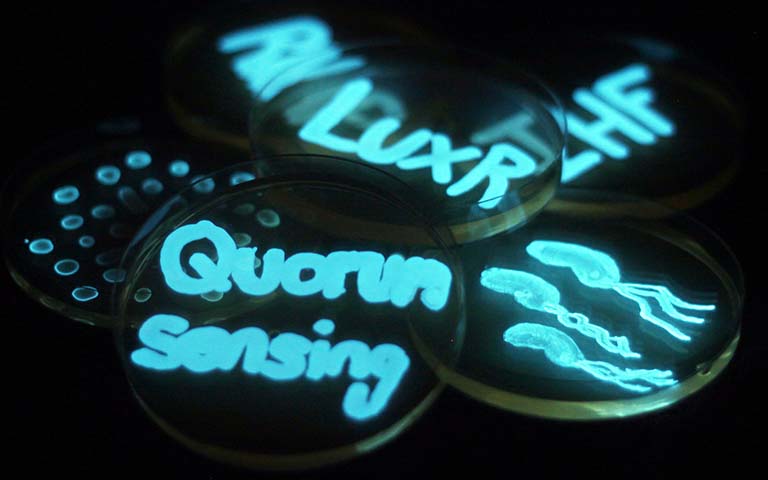IU biologist investigating important signal-blocking compounds that could be key to ‘disarming’ deadly bacteria
Antimicrobial resistance—associated with nearly 5 million deaths worldwide in 2019—is listed by the U.S. Centers for Disease Control and Prevention as one of our most urgent public health problems.
Julia van Kessel, an associate professor in the College of Arts and Sciences’ Department of Biology at Indiana University Bloomington, is developing a new strategy to solve the problem.
She and members of her lab study aspects of quorum sensing, a cell-to-cell signaling system used by bacteria to collectively alter gene expression in response to changes in population density and composition. Quorum sensing controls behaviors that benefit the group for adaption and survival. It helps bacteria detect whether their population numbers are large enough to perform an action, such as mounting an attack on the human body during an infection.
The National Institutes of Health has awarded van Kessel $2,030,527 to continue her research through 2027, a five-year extension of the Maximizing Investigators' Research Award for Early Stage Investigators (R35), first presented by the organization to van Kessel in 2017.
The van Kessel lab has been collecting fundamental data critical to understanding quorum sensing and how it impacts bacterial pathogenesis. The researchers use Vibrio bacteria as established quorum sensing model systems and relevant pathogens. They initially studied the bioluminescent species Vibrio harveyi for which the most is known about quorum sensing. Their current research now extrapolates from their key basic findings to Vibrio pathogens such as Vibrio vulnificus, the causative agent of the disease vibriosis in humans.
The researchers’ previous work identified important and highly conserved biochemical, biophysical, and genetic features of LuxR and Vibrio quorum signaling systems that govern gene expression. In Vibrio species, LuxR is the master transcription factor and the conserved core regulator of quorum sensing genes and virulence.
The van Kessel lab’s proposed research will expand upon its earlier findings to examine gene regulation by LuxR at the mechanistic level and then more broadly connect this information to the conservation and impact of quorum signaling networks across Vibrio species.
One aspect of van Kessel’s research will employ newly identified and patented antimicrobial compounds: a panel of thiophenesulfonamide inhibitors developed in her lab to specifically block LuxR protein function in Vibrio bacteria. These molecules are key tools that will guide their understanding of LuxR function and inform structure-activity modeling and inhibitor design for potential therapeutic compounds.
With increased knowledge about how quorum sensing and proteins control pathogenesis in bacteria, van Kessel hopes to develop these compounds into drugs that target the quorum sensing pathway. When bacteria cannot use quorum sensing to count their numbers, they do not know when to launch their “attack” and cannot cause disease.
Traditional antibiotics used to treat disease and infection work by preventing bacterial cell growth. Antibiotics are quite effective, but they also have a high potential to generate antibiotic resistance. If drugs that block quorum sensing are used, they would stop expression of virulence genes but not kill the bacteria. The immune system could clear the infection, and the rate of antibiotic resistance would be minimized.
“It’s like taking the weapons away from the army but not killing the soldiers,” van Kessel explains. “It’s an effective strategy to stop the war with less damage. Understanding quorum signaling and how it impacts bacterial pathogenesis has the potential to contribute to advances in vibriosis disease treatment and other bacterial infections.”

Original source can be found here.

 Alerts Sign-up
Alerts Sign-up